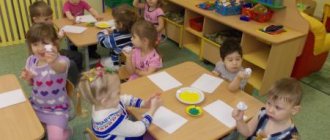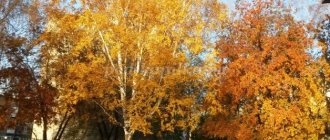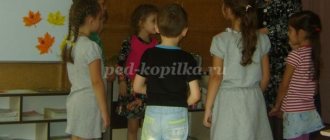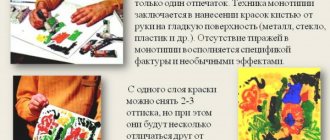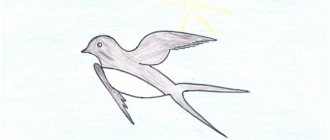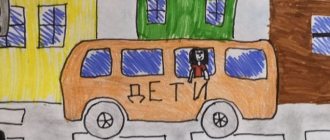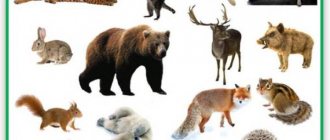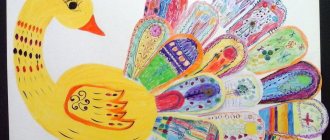MAGAZINE Preschooler.RF
Abstract of the artistic and aesthetic integrated lesson “Autumn Leaves” (senior age group).Yurkova Elena Aleksandrovna, teacher of the 1st category, MBDOU No. 4, Krasnodar region, Krylovsky district, art. Krylovskaya
Goal: To develop children's creativity, imagination and musical memory.
Program content
Educational objectives:
- develop the ability to independently choose the content of your drawing
- to form the need to create a general drawing from individual works, the ability to evaluate one’s work
Educational:
- develop a sense of beauty in contact with music, fine arts, and native words.
Educational:
- cultivate a love for various types of art.
Preliminary work:
Reading poems: A. Tolstoy “Autumn”, I. Bunin “Autumn”, memorizing the poem “Autumn” ; learning songs: “Autumn Mushrooms”, “Falling Leaves”. Looking at paintings and illustrations about autumn. Consideration of the plot painting “Autumn Day” . Observations on a walk. Ecological activities and games on the theme “Autumn”.
Vocabulary work: invisible, dance, stencil, fantasy, priming.
Materials and equipment: stencils of autumn leaves, gouache, foam sticks, interactive whiteboard.
Move.
Children come in to the music and sit on chairs.
Leading:
Hello guys!
Look how beautiful it is here! (the group is decorated with autumn leaves, there are bouquets with dried leaves in vases).
Children, what time of year is it now?
Children: Autumn.
Leading:
Today we have an unusual activity. We will listen to music, poetry and draw autumn leaves. Guys, tell me what color the leaves become in the fall?
Children: Red, yellow, orange, brown.
Host: Correct.
Now listen to a poem about autumn leaves, to the music of P. I. Tchaikovsky “Autumn” - “October” .
The teacher reads a poem to music. If it’s autumn, everyone knows, leaves are walking in the sky, The leaves are different colors: yellow and red. Adults and children know that the wind swirls these leaves, Like an invisible shepherd, like the wind, dances the leaves. The same ones spin around merrily and fall at our feet. If you run slowly, you can hear them rustling under your feet here and there - they sing a song to the children. The leaves fall, swirl and lie at my feet. I will stretch out my palm and take one piece of paper. And then the second and third... They are good, believe me! I’ll collect autumn greetings in a big bouquet!
Host: Did you like the poem?
Children: Yes!
Host: What is this poem about?
Children: answer...
And now all attention is on the screen. You will see a presentation “Colors of Autumn” , to the music of composer A. Vivaldi “The Seasons” - “Autumn” .
Children are offered a presentation “Colors of Autumn” . After watching the presentation.
Host: Did you like it?
Children: Yes.
Educator: Once again we are convinced that autumn is a wonderful time of year. The autumn sorceress painted the leaves with bright colors. Guys, look, on the table in front of you are sheets with stencils of leaves and diluted paints. “priming” method , you must decorate them. You will complete the task to the music of the Russian composer A. Vivaldi “Autumn” .
Children do the work as shown by the teacher.
Educator: Guys, let's rest a little and do some physical exercise.
We're all a little tired. Well, the guys stood up together! Hands up and hands down, And you will bend a little. They twirled and twirled, And they all sat down on the spot, And they jumped around, guys. How do you like charging?
Now we continue to decorate our leaves.
Guys, what beautiful leaves you turned out. Look guys, they are all different - not alike.
Raise your work up, and we will find ourselves in the autumn park.
Children raise the sheets above themselves.
And now a light breeze has blown, and our leaves are swaying in the wind.
The children wave the leaves lightly.
Well done. Put your hands down. Guys, did you like our lesson?
Children: yes.
Presenter: Today you tried: you listened carefully to musical works, answered all the questions correctly, showed your ability to perform collective work, showing creativity and imagination.
And you can take your works to the group and decorate it with autumn leaves.
| Next > |
"Autumn leaves"
Construct of joint educational activities
according to PM 02 Organization of various types of activities and communication of preschool children
Zabrodina Valeria Alekseevna
Date: 10/16/2019
DOW No.: 86
Group:
Senior (5-6 years old)
Educator:
Ivanova Ekaterina Vladimirovna, Leonova Vera Ivanovna
Head of practice:
Temereva Lyudmila Petrovna
Educational area:
artistic and aesthetic development
Type of OD:
drawing
Subject:
"Autumn leaves"
Forms
: frontal, individual
Target:
develop children's artistic creativity through drawing autumn leaves from life
Planned result:
Children show interest in drawing autumn leaves from life
Children are interested in visual arts
Children have a developed creative imagination
Children can draw autumn leaves from life, conveying their shape and color.
Children can draw autumn leaves from life with a brush.
Children can mix watercolor paints to create complex shades and convey autumn color
Children know how to correctly position a sheet of paper and draw on A4
| TASKS educational program |
| Educational : to cultivate interest in drawing autumn leaves from life Developmental: continue to develop children's interest in visual arts Educational: figurative: teach children to draw autumn leaves from life, conveying their shape and color technical: introduce drawing autumn leaves from life with a brush color: improve visual techniques (mix watercolors to obtain complex shades and convey autumn color) compositional: teach children to position the sheet correctly, draw on A4 |
Principles of preschool education (FSES DO):
building educational activities based on the individual characteristics of each child, in which the child himself becomes active in choosing the content of his education, becomes the subject of education;
assistance and cooperation of children and adults, recognition of the child as a full participant (subject) of educational relations;
supporting children's initiative in various activities;
formation of cognitive interests and cognitive actions of the child in various types of activities;
age adequacy of preschool education (compliance of conditions, requirements, methods with age and developmental characteristics);
Principles of training
: the principle of learning in the zone of proximal development, the principle of clarity, systematicity and consistency, the principle of consciousness, the principle of activity, the principle of accessibility.
Principles of education:
formation of a personal style of relationships with peers and teachers, creation of a positive emotional background and an atmosphere of emotional uplift, education through interaction.
